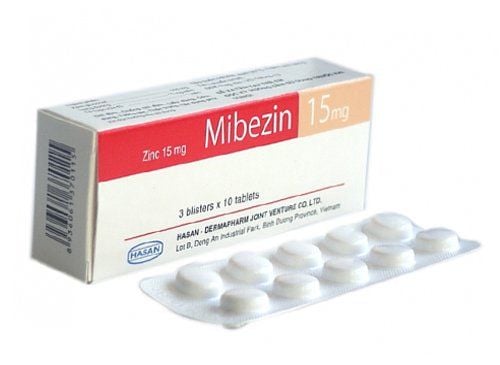This is an automatically translated article.
The article is professionally consulted by Master, Doctor Nguyen Thi An - Pediatrician - Neonatologist - Department of Pediatrics - Neonatology - Vinmec Ha Long International HospitalZinc is a trace mineral that is essential for each stage of the development of infants and young children. Therefore, it is extremely important to supplement zinc for babies, not only to help them sleep well and eat well, but also to support the strengthening of resistance, height as well as intelligence in the most comprehensive way.
1. Importance of zinc for infant development
Zinc is one of the trace minerals that play an important role in the overall health of infants. In the human body, zinc is directly involved in the production of enzymes, which promote protein synthesis.When adequate zinc supplementation for infants can contribute to more efficient protein synthesis. Thereby promoting children's comprehensive development in physical aspects such as height, muscle, weight and immune system.
On the other hand, strengthening resistance through zinc supplementation for infants can help them avoid harmful agents entering the body such as bacteria, viruses or fungi. This also helps children to be less sick, increases appetite and stimulates other senses.
In addition, zinc supplementation for infants also helps to increase the child's ability to recover from wounds. However, like other nutrients, sometimes giving zinc to babies can have some negative effects. Specifically, overdosing or underdosing of zinc in infants can make babies prone to nausea, colic, digestive disorders, anorexia and even stunted growth.
2. How should zinc supplements be given to infants?
So what is the most appropriate and safest way to supplement with zinc for infants? How should I supplement and how much? get attention from many people.In fact, the need for zinc in babies will vary, depending on each stage of development as well as the age of the child. Below is the recommended dose of zinc for infants by the World Health Organization (WHO), including:
Children aged 0-6 months: 2mg/day supplement Children 7-11 months old: Supplement 3mg/day Children from 1 to 3 years old: Add 3mg/day Children from 4 to 8 years old: Supplement with 5mg/day Children from 9-13 years old: Add 8mg/day Children from 14 years old and over: Supplement 11mg/day (for boys) and 9mg/day (for girls).

Bổ sung kẽm cho trẻ sơ sinh như thế nào là thắc mắc của nhiều người
3. Some of the most common ways to supplement zinc for babies
3.1. Zinc supplementation for infants under 6 months of age At this age, breast milk is considered the best and fastest way to supplement zinc for infants. During the early stages of lactation, breast milk not only provides a great source of zinc, but also contains many other nutrients and antibodies. Therefore, you should try to take advantage of this precious source of breast milk to help your baby receive the necessary amount of zinc necessary for comprehensive physical development.Not only in the lactation period, zinc supplementation for pregnant women during pregnancy is also extremely important because it can help the fetus absorb zinc for healthy development right from the womb. Daily nutrition for pregnant women should include foods rich in zinc and other essential micronutrients, including:
Shrimp, crab, fish, eggs and meat (zinc-rich food group). Foods rich in vitamin C such as tangerines, lemons, oranges and grapefruits help enhance the absorption of zinc for the pregnant mother's body. Consume a lot of beans and seeds, especially soybeans. If you want to supplement both iron and zinc at the same time, you should take zinc about 2 hours before taking iron because iron can interfere with the absorption of zinc by the body. Supplement zinc at a moderate level, avoid using an overdose that causes an excess of zinc. 3.2. Zinc supplements for children aged 6 months and older Children from 6 months of age and older have begun to have their first impressions of food. At this time, the mother should introduce the baby to weaning and change the daily diet to create a sense of excitement when eating as well as to ensure nutrition.
You can supplement your infant with zinc at this age through choosing foods rich in zinc such as beans and nuts.
3.3. Zinc supplements for malnourished infants For malnourished infants, you should prepare foods for your baby according to many food groups with different nutrients. Below are zinc-rich foods for malnourished infants, including:
Fish Eel Prawn Crab Meat Oyster Soybeans Nuts Broccoli Spinach Garlic 3.4. Supplementing zinc for children with anorexia It is really difficult to force children to eat according to your own wishes. Therefore, to help your baby feel more excited when eating and eat more deliciously, while still meeting the criteria of adequate zinc and other nutrients for the child's body, you should "indulge" according to your wishes. little.

Bổ sung kẽm cho trẻ sơ sinh là một việc vô cùng quan trọng
Besides supplementing zinc for infants through daily diets, mothers can also provide adequate zinc for anorexia babies through other complementary foods. For oral zinc supplements, you should give them to children 30 minutes after meals, use them for 2-3 months and stop after that. In addition, do not forget to add vitamins such as vitamins C, B6 and A for children to increase zinc absorption.
However, health care experts still encourage mothers to supplement zinc for infants as well as children through natural sources of fresh green food every day. This supplement will help your baby's body receive more zinc, while increasing the absorption of this important micronutrient.
Most parents today simply think that just supplementing with an adequate amount of calcium will help their baby achieve comprehensive growth in height as well as bone strength. However, this concept is not really correct and sufficient.
Besides calcium supplements, you also need to pay attention to the selection and search for adequate and appropriate sources of zinc for infants. Only in this way will the child's body receive essential nutrients, supporting the immune health and comprehensive development of both physical and mental health of the child.
In general, zinc plays a very important role in the immune health as well as the overall physical development of children in the first years of life. Therefore, parents should focus on supplementing with zinc and lysine, essential micro-minerals and vitamins such as zinc, chromium, selenium, and B vitamins to help fully meet their nutritional needs. digestion, enhance the ability to absorb nutrients, help improve anorexia, help children eat well.
For more nutritional knowledge and child care for each age, parents should regularly visit the website vimec.com and make an appointment with the leading doctors, pediatric and nutrition experts of the National General Hospital. Vinmec when needing advice on children's health.













